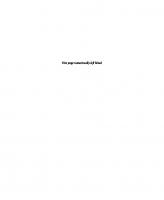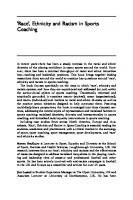Race and Racism: Canada's Challenge 9780773574229
According to reliable forecasts, by the year 2016 visible minorities will comprise 20 per cent of the Canadian populatio
138 10 16MB
English Pages 328 [341] Year 2000
Contents
List of Tables and Figures
Preface
Contributors
1 The Race Challenge 2000
I.CONCEPTS AND THE THEORIES
2 Historical and Political Reflections on Race
3 Race in the Canadian Census
4 Racial Integration: Theoretical Options
5 Individual versus Collective Rights in Quebec
II.ECONOMIC AND SOCIAL FACTORS
6 A Model of Refugee Resettlement
7 Economic Adaptation of Asian Immigrants
8 Employment Equity for Visible Minorities
III. RACISM AND DISCRIMINATION
9 Public Opinion on Visible Minorities
10 Racism: Evidence from National Surveys
11 Discrimination: An Invisible Evil
IV. MINORITIES COPING IN CITIES
12 Redefinitions of South Asian Women
13 Acculturation and Chinese Delinquency
14 Chinese Refugees Coping with Stress in Toronto
References
Index
A
B
C
D
E
F
G
H
I
J
K
L
M
N-O
P-Q
R
S
T
U-V
W
Y-Z
Recommend Papers

- Author / Uploaded
- Leo Driedger
- Shiva Halli
File loading please wait...
Citation preview
RACE AND RACISM
This page intentionally left blank
RACE AND RACISM CANADA'S CHALLENGE
Edited by Leo Driedger and Shiva S. Halli
PUBLISHED FOR CARLETON UNIVERSITY BY MCGILL/QUEEN'S UNIVERSITY PRESS, MONTREAL & KINGSTON/LONDON/ITHACA
Copyright © McGill-Queen's University Press, 2000 ISBN 0-88629-365-0 (paper) Printed and bound in Canada Reprinted 2004 Canadian Cataloguing in Publication Data Main entry under title: Race and racism : Canada's challenge Essays originally presented at a conference held in Winnipeg, Nov. 2J--2/, 1996. Includes bibliographical references and index. ISBN 0-88629-362-6 (bound) ISBN 0-88629-365-0 (pbk.) 1. Canada—Race relations. 2. Racism—Canada. I. Driedger, Leo, 1928- II. Halli, Shivalingappa S., 19^2-
FC/o^.Rj//2000
joj.#'00971
C99-9O/J09-J
F/OJJ.A/R.J22 2OOO
Interior: Lynn's Desktop Publishing.
McGill-Queen's University Press acknowledges the financial support of the Government of Canada through the Book Publishing Industry Development Program (BPIDP) for our publishing activities. We also acknowledge the support of the Canada Council for the Arts for our publishing program.
CONTENTS List of Tables and Figures Preface Contributors 1
The Race Challenge 2000 Leo Driedger and Shiva S. Halli
vi ix xi
/
I. CONCEPTS AND THE THEORIES 2 3 4 j
Historical and Political Reflections on Race Sylvia Wargon Race in the Canadian Census Monica Boyd, Gustave Goldman, and Pamela White Racial Integration: Theoretical Options Leo Driedger and Shiva S. Halli Individual versus Collective Rights in Quebec Joseph O'Shea
20 jj J7 77
II. ECONOMIC AND SOCIAL FACTORS 6 7 8
A Model of Refugee Resettlement Nancy Higgitt Economic Adaptation of Asian Immigrants Ravi B.P. Verma and Kwok Bun Chan Employment Equity for Visible Minorities T. John Samuel and Aly Karam
98 116 134
III. RACISM AND DISCRIMINATION 9 10 //
Public Opinion on Visible Minorities Leo Driedger and Angus Reid Racism: Evidence from National Surveys John Berry and Rudolf Kalin Discrimination: An Invisible Evil Donald W. Taylor, Stephen Wright, and Karen Ruggiero
152 772 186
IV. MINORITIES COPING IN CITIES 12 13 14
References Index
Redefinitions of South Asian Women Helen Ralston Acculturation and Chinese Delinquency Siu Kwong Wong Chinese Refugees Coping with Stress in Toronto Guang Tian
204 23 5 2jj 277 321
TABLES /./ The Four Stages of Maintaining the Two-Category System of Stratification
//
3.1 Historical Overview of Canada's Collection of Ethnic and Racial Origin Data by Census Year
3$
3.2 Descent Rules by Census Year by Ethnic/Racial/Tribal Origin
37
3.3 1991 and 1996 Census: Test and Census Questions
46
4. i The Assimilation Variables Developed by Gordon
60
7. i Immigration Flow to Canada by Country of Last Residence
/17
7.2 Percentage Distribution of Occupations and Index of Dissimilarity between Canadian-born and Asian Immigrants 124 7.3 Average Income and Relative Index of Selected Immigrant and Canadian-born Groups
127
7.4 Measures of Economic Performance of Selected Immigrants and Canadian-born Persons
128
8. i Representation of Designated Groups in the Public Service 1988-95
139
8.2 Visible Minorities in the Public Service by Occupational Category and Age 140 8.3 Visible Minorities in the Public Service, 1987-95
141
8.4 Total and Visible Minority Employees by Sector for FederallyRegulated Industries
146
9.1 Means of Evaluations of Various Ethnic Groups
161
9.2 Canadian Attitudes toward Immigration, Ethnic, and Racial Diversity
162
9.3 Degree of Comfort Canadians Feel Around a Variety of Recent Immigrants
163
9.4 Mosaic Versus Melting Pot Preferences
166
9.5
Feelings of Uneasiness
167
9.6 National Perceived Discrimination
167
9.7 Approval of Intergroup Marriage
169
9.8 Perceptions that Groups Have "Too Much Power"
170
IQ.I Measures of Ethnocentrism (1974) and Tolerance (1991)
176
I}. I Means of the Variables for Native-born and Foreign-born Respondents
242
13.2 Immigrant Status and Other Factors of Acculturation
245
13.3 Effects of Acculturation on Delinquency
246
13.4 Correlations between Acculturation and the Variables of Parental Control
247
13.5 Effects of Parental Control on Delinquency
249
14.1 Types of Stress and Related Factors
257
14.2 MCR's Experience of Discrimination by Education
263
14.3 MCR's Satisfaction with Social Life in Canada
267
14.4 Satisfaction by Five Factors
2 68
14.5 MCR's Coping Resources and Behaviour
270
FIGURES /./ A Conformity-Pluralist Conceptual Model
67
j.i Birth Rate in Quebec, 1931-91
84
5.2 Immigrants to Quebec, 1945-90
85
5.3 Interprovincial Migration, 1961-92
88
6. i Schematic View of Well-being According to Refugee Definitions /Oj" 6.2
Adaptation and Characteristics of Resettlement
/o









